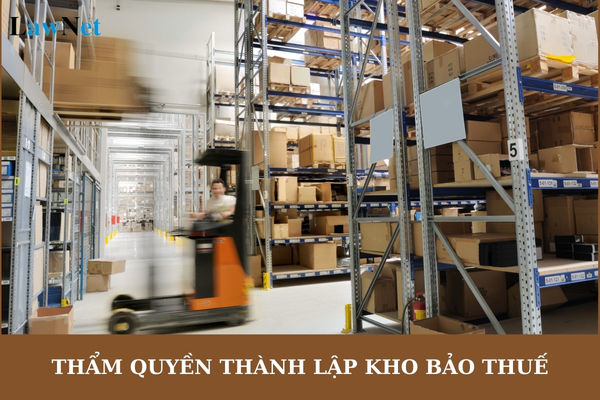Who has the authority to establish tax suspension warehouses? What are the conditions for recognizing a tax suspension warehouse in Vietnam?
Who has the authority to establish tax suspension warehouses in Vietnam?
Based on Clause 3, Article 62 of the Customs Law 2014, the authority to establish tax suspension warehouses is stipulated as follows:
Conditions for establishing bonded warehouses, tax suspension warehouses, and locations for consolidating goods
- Bonded warehouses and locations for consolidating goods shall be established in the following areas:
a) Seaports, international civilian airports, domestic export and import warehousing ports, land border gates, and international intermodal rail stations;
b) Industrial zones, high-tech zones, non-tariff zones, and other areas in accordance with the law.
- tax suspension warehouses shall be established within the factory premises of export-oriented manufacturing enterprises.
- The Director General of the General Department of Customs decides on the establishment, extension, temporary suspension, and termination of bonded warehouses, tax suspension warehouses, and locations for consolidating goods.
- The Government of Vietnam provides detailed regulations on the establishment and operation of bonded warehouses, tax suspension warehouses, and locations for consolidating goods.
Thus, the Director General of the General Department of Customs has the authority to establish tax suspension warehouses.

Who has the authority to establish tax suspension warehouses in Vietnam? What are the conditions for recognizing a tax suspension warehouse? (Image from the Internet)
What are the conditions for recognizing a tax-protected warehouse in Vietnam?
According to Article 16 of Decree 68/2016/ND-CP, the conditions for recognizing a tax-protected warehouse include:
- An enterprise recognized as a priority enterprise shall have a recognized tax-protected warehouse if it meets the following conditions:
+ Having an accounting system and application of information technology standards according to the state's management agency to track, manage imported, exported, stored, and available goods in the warehouse;
+ Located within the production premises of the enterprise, separated from the area containing non-tax-protected raw materials and supplies, with a surveillance camera system installed to meet customs agency data exchange standards to monitor the entry and exit of goods from the tax-protected warehouse.
- Export-oriented manufacturing enterprises with an export turnover of 40 million USD or more shall be recognized for a tax-protected warehouse, besides conditions stipulated in Clause 1, Article 16 of Decree 68/2016/ND-CP, and shall also comply with the following conditions:
+ Have engaged in export activities for at least 02 consecutive years without any customs and tax law violations;
+ Comply with accounting and statistical laws;
+ Conduct payments through banks as per the law.
What are rights and obligations does the tax-protected warehouse owner in Vietnam?
According to Clause 2, Article 63 of the Customs Law 2014, the tax-protected warehouse owner has the following rights and obligations:
Rights and obligations of bonded warehouse businesses, businesses operating locations for consolidating goods, service businesses for consolidating goods, goods owners, and tax-protected warehouse owners
- Bonded warehouse businesses and goods owners sending goods to bonded warehouses have the following rights and obligations:
a) Bonded warehouse businesses may execute contracts for receiving goods to bonded warehouses and may move goods within bonded warehouses based on agreements with goods owners.
Bonded warehouse businesses must comply with inspection requests from customs authorities. Every 03 months, the bonded warehouse business must provide the current status of goods and bonded warehouse activities to the overseeing Customs Department in writing;
b) Goods owners are allowed to reinforce packaging, classify goods, sample goods, and perform other tasks under the supervision of customs officials; they are allowed to transfer ownership of goods. Transferring goods from one bonded warehouse to another requires written consent from the Director of the Customs Department managing the warehouse where the goods are stored.
2. Tax-protected warehouse owners have the following rights and obligations:
a) Store goods such as imported raw materials and supplies for the production of export goods;
b) Arrange, re-pack, and move goods within the tax-protected warehouse;
c) Notify the customs authority in advance of expected plans to bring raw materials and supplies from the tax-protected warehouse into production;
d) Every 03 months, provide the current status of goods and activities within the tax-protected warehouse to the overseeing Customs Department in writing;
dd) By January 31st each year at the latest, prepare a summary of import customs declarations and the amount of raw materials and supplies stored in the tax-protected warehouse, and export customs declarations and the amount of exported goods from the previous year to the overseeing Customs Department.
...
From the above regulations, it can be noted that the tax-protected warehouse owner has the following rights and obligations:
- Store goods such as imported raw materials and supplies for the production of export goods;
- Arrange, re-pack, and move goods within the tax-protected warehouse;
- Notify the customs authority in advance of expected plans to bring raw materials and supplies from the tax-protected warehouse into production;
- Every 03 months, provide the current status of goods and activities within the tax-protected warehouse to the overseeing Customs Department in writing;
- By January 31st each year at the latest, prepare a summary of import customs declarations and the amount of raw materials and supplies stored in the tax-protected warehouse, and export customs declarations and the amount of exported goods from the previous year to the overseeing Customs Department.

